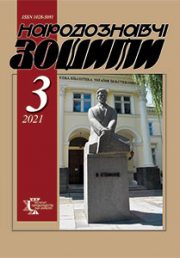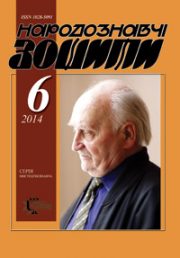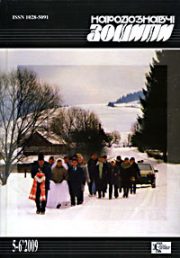The Ethnology Notebooks. 2018, 2 (140), 454—462.
UDK 612.01
DOI https://doi.org/10.15407/nz2018.02.454
Received 15.02.2018
FORMATION OF THE ETHNO-ARTISTIC CULTURE OF STUDENTS IN THE SPHERE OF ARTS AND CRAFTS
Mojseі Ludmyla, doctor of historical sciences
Researcher of Institute of Cultural Heritage of the Academy of Sciences of Moldova.
1 Stefan cel Mare, Chisinau, Moldova
Babyna Juliana, postdoctoral,
Department of Pedagogy, «Ion Creangă»
State Pedagogical University.
1 Ion Creangă str., Chisinau, Moldova
Abstrakt. The relevance of this study is that at the present stage of the development of European society, significant changes in higher education, including artistic ones, have become noticeable. Referring to the age-old interference in the post-Soviet space in the field of science, art and folk traditions, the pedagogical practice of scientists and teachers is increasingly concerned with the ethno-cultural culture of students.
Keywords: Ethno-cultural culture, ethno-regional culture, ethno-pedagogical culture, students, component, ethno-artistic training.
REFERENCES
Babina, Ju. (2016). Razvitie moldavskogo kovra v sovremennoj industrial’noj sisteme Respubliki Moldova (na primere AO «Floare-Karpet»). Nauchnye issledovanija, Rossijskij nauchno-issledo-vatel’skij zhurnal, 10 (11), 101—104 [in Russian].
Zelenchuk, V. & Postolaki E. (1990). Kovorul moldovenesk. Al’bom. Kishinjeu: Timpul [in Moldova].
Antonesei, L. (2001). Modernitatea, globalizarea єi dialogul culturilor private din perspectiva educației culturale. O nouг provocare pentru educație: interculturalitatea [in Moldova].
Arbuz-Spгtari, O. & Simac, A. (2012). Dezvoltarea creativitгții artistice la studenți оn cadrul cursului de artг textilг. Chiєinгu: Goromont-Studio [in Moldova].
Moisei, L. (2015). Ornamentica юesгturilor tradiюionale din Republica Moldova. Teza de doctor оn istorie. Chiєinгu [in Moldova].
Postolachi, E. (2010). Modificгri оn arta covorului moldovenesc (sec. XX). Buletinul Єtiinюific al Muzeului Naюional de Etnografie єi Istorie Naturalг a Moldovei (Vol. 13 (26), pp. 119—129). Chiєinгu [in Moldova].
Simac, A. (2001). Tapiseria contemporanг din Republica Moldova (Evoluюia tapiseriei contemporane din Republica Moldova оn anii 1960—2000). Chiєinгu: Știința [in Moldova].
Stoica, G. (2010). Scoarюele moldoveneєti. Оntre popular єi Artizanal. Buletinul Єtiinюific al Muzeului Naюional de Etnografie єi Istorie Naturalг a Moldovei (Vol. 13 (26), pp. 23—33). Chiєinгu [in Moldova].
Retrieved from: www.floare-carpet.md.







